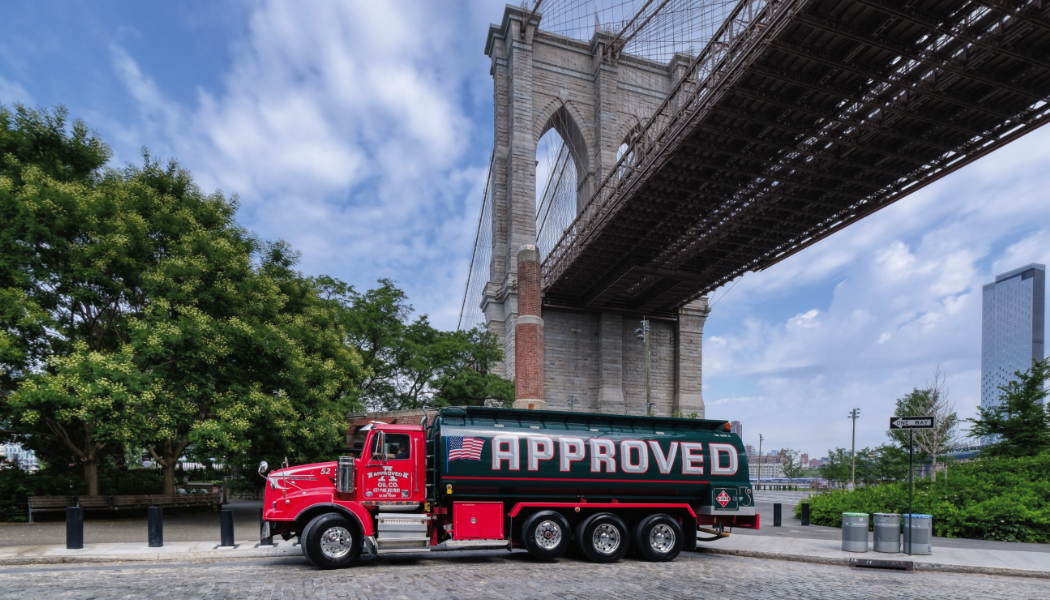Approved: the fuel company that aims to sell less fuel
New York City building owners face a mountain of local laws requiring properties to reduce their carbon emissions while maintaining specific heating levels, water temperatures, maintenance schedules and other mandated standards. Those building owners look to Approved to make sense of it all.
“Approved is one of the largest boiler contractors in the City,” explains John Sutherland, Director of Sales at Approved. “They come to us for the knowledge to help our customers through the maze of laws. Trying to help them get to the right fuel is our job #1; but once they get the right fuel, we help them use less of that.”
Approved offers its customers fully integrated energy solutions to handle all their energy needs. The “right fuel” is the most environmentally friendly fuel based on the state and local clean energy standards, but if customers want to go beyond those standards, Approved will provide whatever higher blends they request. Then, Approved’s team puts as much attention into keeping their customers’ mechanical systems working at their highest efficiencies.
The company offers boiler upgrades, boiler and burner services, fuel oil upgrades, pipe insulation, and any other mechanical services needed. These days, much of their work is retrofitting and installing energy management systems (EMS).
EMS are installed on all new boiler installations to meet the requirements of Local Law 97 (LL97), and are being added to existing systems because of their state-of-the-art capabilities. LL97 requires buildings over 25,000 square feet to reduce their carbon emissions 40 percent by 2030 and 80 percent by 2050, with the first emissions reports due this year. Failure to comply with reporting mandates or to meet the emission reduction targets comes with heavy fines.
EMS measure the heat in the building, the outside temperature, water usage, and stack temperature, and cycle the boiler as needed. They also track the time of day when heating is needed the most and can slowly increase output for increased comfort with lower usage, and then cut back as necessary when the high demand period has passed. It all adds up to reducing the amount of energy that building is using, day in and day out.
Gone are the days of boilers running 24/7 from September through May, of residents opening windows in sub-freezing weather to cool off, or of heat pouring out of radiators when it was 70° outside. Approved installs EMS systems that can measure the temperatures of individual units and adjust output accordingly. On moderate days, a unit on an upper floor that faces the sun may not need heating, while one on the ground floor in the back of the building may require a little push to reach the City’s mandated minimum temperature. These computerized systems can be reading and adapting to 20-25 sensors in the building at the same time, and will provide the volumetric and usage reports required by LL97 to show reduced fuel usage. In fact, two of the three leading EMS systems guarantee a 15 percent savings.
Chris Fazio, Approved Executive Vice President, notes that there are currently discussions among lawmakers to include biofuel blends as an emissions-reducing factor. “What’s interesting is everyone is saying ‘let’s go to natural gas, electricity, to reduce emissions.’ If someone wants to go to natural gas, we can do that for them, but it can quickly become an expensive capital improvement project that will cost them a couple hundred thousand dollars. Going to a B20 blend is just as good, delivers as much a reduction in carbon intensity as switching to natural gas, and it’s a drop-in replacement, so there are no extra costs to meet those same requirements.”
In addition, virtually every property owner in New York State is concerned about the cap-and-invest plan currently under development. “Cap and invest is going to affect everyone. They’re trying to put a cap on the total emissions for the state, and if you exceed the cap, you have to pay a fine (or penalty),” Fazio explains. “What magnitude that’s going to be, we don’t know yet. But it’s going to affect everyone, from the producer to the blender to the wholesaler to the end user.” Approved is working with representatives at the state and city level to recognize the value of Bioheat® fuel in their decarbonization programs.
The company’s fully-integrated energy solutions stretch from fuel supply to mechanical services to advocating for its clients at the highest levels of government. It all fits under the Approved mission to provide a cleaner, greener, New York City; by providing the most environmentally friendly fuels for each customers’ needs; and then to sell them less of it.


